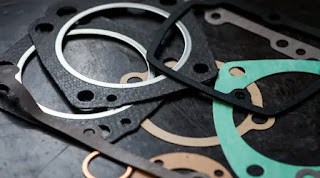Unlocking the Power of Spiral Wound Gaskets: Sealing Excellence for Every Industry
In the world of industrial sealing solutions, the spiral wound gasket stands as a testament to innovation and reliability. These remarkable gaskets have become the go-to choice for engineers and manufacturers across various industries, providing exceptional sealing performance in a wide range of applications. In this blog post, we'll explore the world of spiral wound gaskets, their construction, their advantages, and the diverse sectors they serve.
What is a Spiral Wound Gasket?
A spiral wound gasket is a specialized type of industrial gasket used to seal flanged connections. Its unique design combines the strength of metal with the flexibility of a filler material, typically graphite or PTFE (polytetrafluoroethylene). The result is a highly effective seal that can withstand extreme temperatures, pressures, and corrosive environments.
Construction and Composition
The key components of a spiral wound gasket include:
Outer Ring: Usually made of carbon steel or stainless steel, the outer ring provides stability and alignment to the gasket.
Inner Ring: Like the outer ring, the inner ring also aids in centering the gasket within the flange. It can be manufactured from various materials to suit specific applications.
Metal Winding: This layer comprises a continuous metal strip, typically stainless steel or other alloys, that is wound spirally with a V or W profile. This metal winding imparts strength and resilience to the gasket.
Filler Material: Positioned between the metal winding, the filler material is responsible for sealing against the flanges. Popular filler materials include graphite, PTFE, or a combination of both.
Advantages of Spiral Wound Gaskets
Versatility: Spiral wound gaskets can handle a wide range of operating conditions, making them suitable for various industries, including oil and gas, chemical processing, petrochemical, and power generation.
Reliability: Their robust construction ensures reliable sealing, even under high temperatures, pressures, and corrosive environments.
Conformability: Spiral wound gaskets can conform to irregular flange surfaces, ensuring a tight and consistent seal.
Longevity: These gaskets have a longer service life compared to some other sealing methods, reducing maintenance costs.
Applications
Spiral wound gaskets find applications in numerous industries:
Oil and Gas: Used in pipeline systems, refineries, and offshore platforms to seal flanges in extreme conditions.
Chemical Processing: Vital for sealing in aggressive chemical environments where conventional gaskets may fail.
Power Generation: Commonly employed in power plants to seal high-temperature and high-pressure connections.
Petrochemical: Suitable for sealing critical connections in the production and transportation of petrochemical products.
Conclusion
Spiral wound gaskets have earned their reputation as a versatile and reliable sealing solution. Their ability to withstand extreme conditions makes them indispensable in various industries, where safety and performance are paramount.
Whether you're in the oil and gas sector, chemical processing, power generation, or any other industry that requires robust sealing solutions, consider the spiral wound gasket as your go-to choice. With its impressive track record and proven performance, it's a key player in ensuring leak-free operations and maintaining the integrity of your equipment and processes.


Comments
Post a Comment